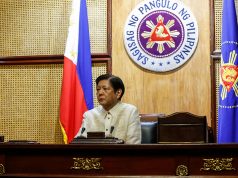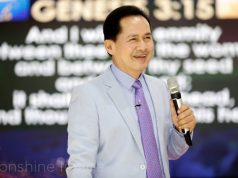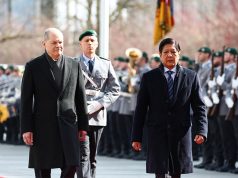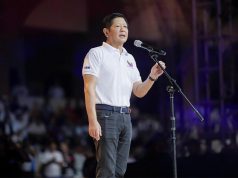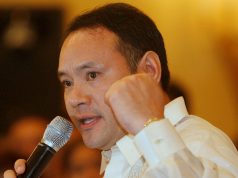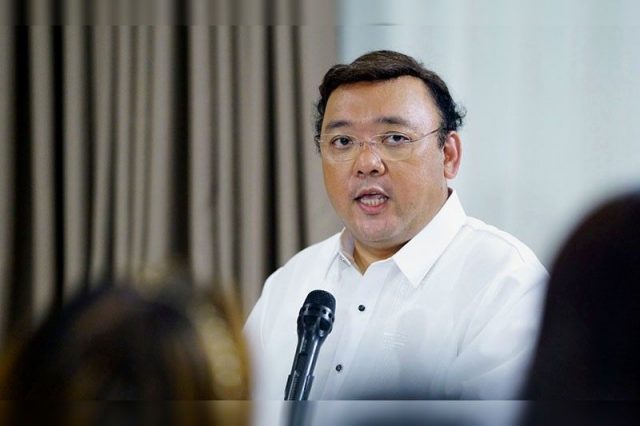
The legality of Harry Roque’s reappointment to his former post as the presidential spokesperson was questioned online even if he withdrew from the political spotlight last year.
Roque’s return as spokesperson was confirmed by now-former spokesperson Salvador Panelo and Sen. Bong Go on Monday.
Panelo also clarified that he still maintains his position as the chief presidential legal counsel.
When reporters asked him of Roque’s reappointment, Panelo responded: “The present crisis requires a new tack in messaging.”
“The Office of the President welcomes Secretary Roque back to the Cabinet and wishes him all the best as he assumes the role of the Chief Executive’s spokesman, a post he has already held in the past,” Panelo added.
In October 2018, President Rodrigo Duterte appointed Panelo to replace Roque, a post that was initially given to the former when Duterte assumed office in 2016.
Roque’s comeback came as a surprise to local social media users. Some Filipinos observed that his recent activities at the mobile app Tiktok might have been a form of campaign for him to return to politics.
“Tiktok works!” a Twitter user said.
Roque released his first dance video on the platform wherein he danced to the beat of “The Weekend” sung by SZA with the hashtag #weekendchallenge last March 5.
Others questioned if Roque’s reappointment was constitutional because they thought he pushed through with his party-list bid during the mid-term polls last year and eventually lost.
The one-year appointment ban after losing to an election is stated in Section 6 of Article IX of the 1987 Constitution.
No candidate who has lost in any election shall, within one year after such election, be appointed to any office in the Government or any Government-owned or controlled corporations or in any of their subsidiaries.
Human rights lawyer Erin Tañada III expressed this concern on Twitter.
If he ran as a nominee under the party list elections & lost, it is my humble opinion that he is covered by the 1yr ban on appointment of losing candidates. He will be entitled to government position one year after May 13, 2019 that will be May 12, 2020 since 2020 is a leap year. https://t.co/7jOuYTZDiy
— Erin Tañada (@erintanada) April 13, 2020
Roque was also supposed to run for a Senate seat, however, he received criticism from Duterte, who said that he would not win because the military disapproved of him.
He then went on an indefinite leave of absence before finally resigning from his position.
A few days before the filing of candidacy, he said he would run as the first representative of environmental group Luntiang Pilipinas Party-list with actress Ciara Sotto.
On the day of filing, however, Roque suddenly changed his mind and pushed for his Senate candidacy under the People’ Reform Party, the political party once led by the late Miriam Defensor Santiago.
However, in February last year, Roque disclosed that he had undergone a non-surgical procedure called percutaneous coronary intervention after discovering he had an “unstable angina coronary disease.”
This led him to drop out of the 2019-midterm elections altogether.
“It is with a truly heavy heart that I announce the withdrawal of my senatorial bid,” Roque said on Facebook.
A controversial spokesperson
Some Filipinos noted that Roque should no longer be called a human rights lawyer after he joined the Duterte administration, which has been accused of committing human rights violations due to the bloody drug war in the country.
Human Rights Watch researcher Carlos Conde also suggested this on Twitter.
“It’s an insult to victims of human rights violations in the Philippines and to the cause of human rights to keep calling Harry Roque a human rights lawyer,” Conde said.
It’s an insult to victims of human rights violations in the Philippines and to the cause of human rights to keep calling Harry Roque a human rights lawyer. https://t.co/Sc0ni7yrbI
— Carlos H. Conde (@condeHRW) April 13, 2020
During his tenure as the president’s spokesman from 2017 to 2018, Roque supported and defended Duterte’s bloody drug war, which resulted in the deaths of thousands of Filipinos mostly from the urban poor.
He also supported Duterte’s decision to pull out from the International Criminal Court in March 2018.
Moreover, Roque likewise defended the chief executive’s tongue-in-cheek remarks and actions which were perceived as misogynistic, inappropriate and unbecoming as the head of state.
Prior to entering politics as a representative of Kabayan Party-list, Roque was a seasoned lawyer who represented the victims of the Ampatuan massacre, the family of murdered transgender Jennifer Laude and the surviving comfort women.




